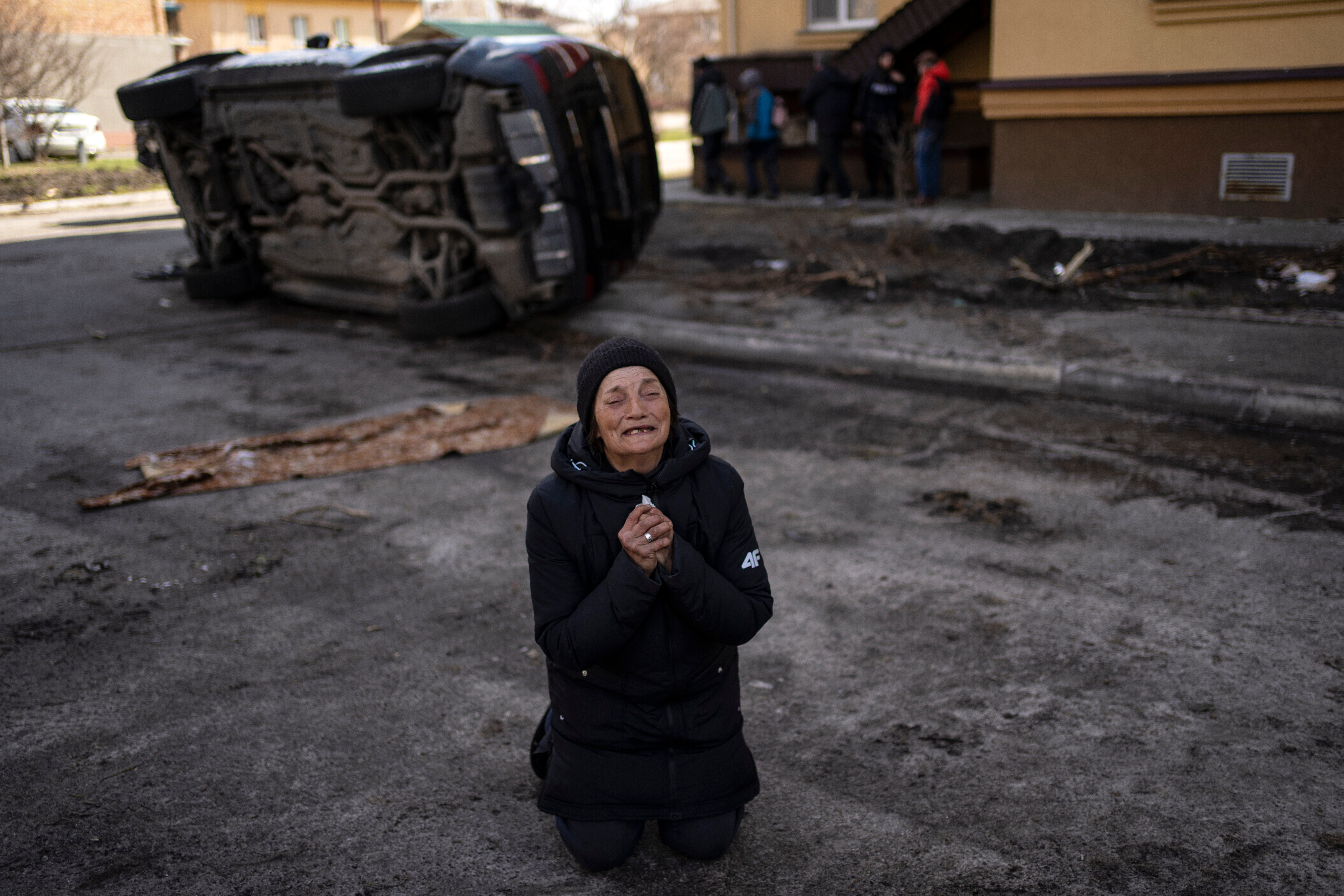
The systematic killing of Ukrainians by Russian forces amounts to genocide, according to an expert on the Holocaust who was born in the country.
Eugene Finkel was born in Lviv, in the west of Ukraine, and left when his family moved to Israel when he was aged 13.
He has written a book about the Holocaust, and has previously published an article warning commentators and the media to be careful about casually using terms such as genocide, which was legally codified by the UN in 1948.
Yet Finkel believes, based on what he has seen of the alleged atrocities, and the systematic nature in which they were carried out, that what the world is witnessing amounts to genocide – defined as the deliberate killing of a large number of people from a particular nation, or ethnic group, with the aim of destroying them.
“It's not just one thing. It's a combination of things,” Finkel tells The Independent.
“The things we’re seeing in Bucha and other places, with the targeting of civilians and mass graves, that could be labelled war crimes, or crimes against humanity, or whatever you want to call it.”
He says those actions must be set in the context of the rhetoric from the Russian state, of its attempt to destroy and take over Ukraine, and kill its people.
“The rhetoric on its own was not enough for me, and the massacres on their own were not enough,” adds Finkel, who still has a number of friends in Ukraine.
“The threshold for me is the combination of this violence, widespread and deliberate, and the rhetoric. I think that is enough evidence.”
Finkel was referring to an article published on Monday morning by the Russian state-owned news agency RIA Novosti. The article, by pundit Timofei Sergeitsev, was headlined “What Russia should do with Ukraine”, and talked about the “final solution to the Ukrainian question”.
“Denazification is a set of measures aimed at the nazified mass of the population, which technically cannot be subjected to direct punishment as war criminals,” said the article, which was highlighted and translated by organisations such as the BBC Monitoring service.
In February, the same news agency published and then deleted an article that was apparently intended to go live once Russia had completed its invasion of Ukraine.
"Vladimir Putin has assumed, without a drop of exaggeration, a historic responsibility by deciding not to leave the solution of the Ukrainian question to future generations,” said the article, written by contributor Petr Akopov.
"Western global domination can be considered completely and finally over.”
Finkel says not every Russian soldier on the battlefield will read every article that is tweeted.
“But they both indicate the state of mind, and they're a quite clear intention of what the state wants, or what the state is more than willing to tolerate,” he says.
Finkel, author of Ordinary Jews: Choice and Survival during the Holocaust, says Russia may not have embarked on a plan of genocide when it began its invasion of Ukraine.
He said there was evidence that ordinary Russian troops felt they would be “welcomed as liberators” but rapidly found they were not.

Speaking from Bologna, Italy, where Finkel is a professor of international relations at Johns Hopkins University School of Advanced International Studies, he adds: “I don’t think they went with this intention, but it evolved.”
The comments from Finkel come amid a flurry of claims made over the weekend of evidence of Russian war crimes in towns such as Bucha, where video footage and photographs showed many bodies.
Ukraine has said that more than 50 bodies found in Bucha, to the northwest of Kyiv, had been victims of extra-judicial killings by Russian troops. Media organisations have not been able to independently verify the claims, though they have documented many dead civilians found in the area after Russian forces pulled out.
Reuters said satellite images showed a 45-foot long trench dug into the grounds of a church where a mass grave was found.
The Kremlin has categorically denied any accusations related to the murder of civilians in the town and said the graves and corpses had been staged by Ukraine to tarnish its image.
Russia has said it would present “empirical evidence" to the United Nations Security Council of what it called lies by Ukraine and its Western sponsors.
At the same time, Joe Biden called Russian President Vladimir Putin a war criminal and called for a trial, and many Western nations called for Russia to be suspended from the UN Human Rights Council.
"Given strong evidence of war crimes, including reports of mass graves and heinous butchery in Bucha, Russia cannot remain a member of the UN Human Rights Council,” tweeted British Foreign Secretary Liz Truss. “Russia must be suspended.”
Carla Del Ponte, the former chief prosecutor of United Nations war crimes tribunals for the former Yugoslavia and Rwanda, called for an international arrest warrant to be issued for Putin.
“Putin is a war criminal,” she told the Swiss newspaper Le Temps in an interview published on Saturday.
Given that all sides in any conflict invariably engage also in an information war in which they seek to spin or control the narrative, Finkel says it is essential that an independent investigation be carried out in the alleged atrocities in Ukraine, and the evidence be gathered and stored.
Yet he says he doubts that anyone senior will ever be brought to justice for what has happened.
“Because the only way in which we can hold perpetrators accountable, and I’m talking about the big wigs, the Putins, the [Russian defence minister Gen Sergei] Shoigus and the generals, is for them to lose the war and to lose power,” he says.
“I just don't see that happening anytime soon.”
He adds: “I would love to be proven wrong.”







